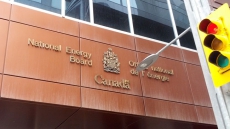OTTAWA - Canada's annual inflation rate was 2.0 per cent in September, a slight dip in the cost of living from the previous month, Statistics Canada said Friday.
The inflation rate had been up 2.1 per cent in the months of August and in July, according to the federal agency's consumer price index.
The Statistics Canada report said in the 12 months leading up to September prices rose in all consumer categories it looks at, with higher housing and food prices leading the way.
The inflation rate for September matched the consensus expectations of economists, according to Thomson Reuters.
"The drop in headline annual inflation in September, to 2.0 per cent from 2.1 per cent, is likely to be the first among many in the coming months," David Madani of Capital Economics wrote in a note Friday.
"In light of recent market events, most notably the slump in world oil prices, the Bank of Canada is likely to remain very much neutral with regard to the interest rate outlook."
The Bank of Canada is expected to make its next rate announcement on Oct. 22 when it will also release its latest monetary policy report.
The central bank is widely expected to hold its key rate at one per cent, where it has been set for more than four years.
Statistics Canada said shelter costs in September climbed 2.7 per cent on a year-over-year basis, an increase led by a 16.2 per cent gain in natural gas prices. Food prices also went up 2.7 per cent in September, which followed an increase of 2.2 per cent in August.
Contributors to the year-over-year increase included meat at 11.5 per cent, cigarettes at 11.4 per cent and telephone services at 7.6 per cent.
Prices increased in all provinces, with Ontario and Alberta seeing the biggest gains of 2.6 per cent each.
Meanwhile, the agency found price drops on goods such as furniture at 4.1 per cent, digital computing equipment and devices at 5.9 per cent and video equipment at 7.4 per cent.
On a seasonally adjusted basis, Canada's cost of living was up 0.2 per cent in September after increasing 0.1 per cent in August.
Core inflation, a figure that excludes some of the most volatile components including some items from the food and energy categories, held steady at 2.1 per cent in September. In August, core inflation, which is followed closely by the Bank of Canada, was also 2.1 per cent.
Meat, one food item calculated as part of Canada's core inflation rate, has had a significant impact.
BMO chief economist Doug Porter said a 1.5 per cent monthly increase in meat prices — and a 11.5 per cent rise year-over-year — drove the annual core inflation rate up by 0.3 percentage points alone. Meat prices, he added, have experienced their fastest rise since the mid-1980s.
Porter wrote Friday in a note that he expected core inflation to continue moving along at just over 2.0 per cent.
He said Bank of Canada governor Stephen Poloz has downplayed the small rise in the cost of living as "transitory" due to the lower dollar and other temporary pressures. Looking to the release of the central bank's monetary policy report next week, Porter said he didn't expect that message to change.
"Look for the focus of next week's quarterly monetary policy report to shift the focus to weak global growth and rising uncertainty, and away from domestic issues such as (consumer price index) and/or sluggish labour markets," Porter wrote.





